Powers of Devotion
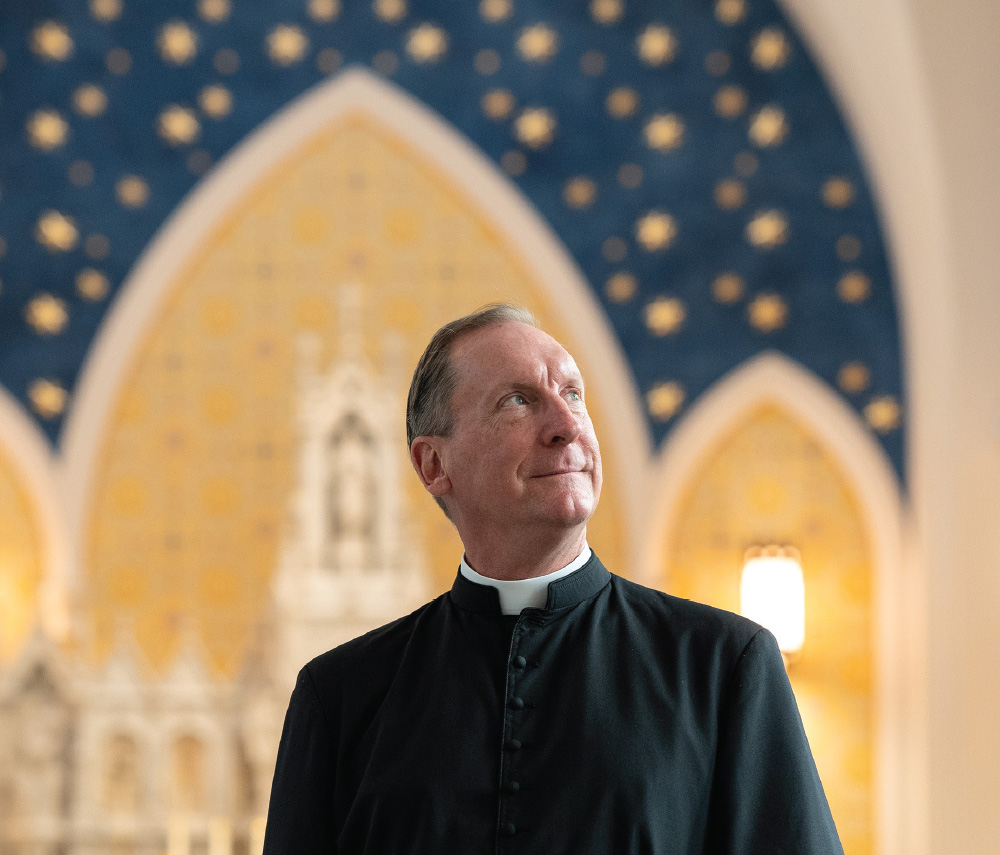
With its multimillion-dollar mansions lining the beach, the island is one of the most expensive ZIP codes in the country. But as children, West and his siblings were beach bumpkins, idling away summers, crabbing and fishing and rollicking in the salty surf. Everyone knew everyone.
“I knew that I could never get into trouble, nor would I want to, because there were eyes always on all of us kids,” he says. “And back then, it took only five digits to ring another telephone on Sullivan’s Island, and somebody would be sure to call my mother.”
West’s parents were deeply religious and sacrificed to put their children through Catholic schools. Sunday Mass at the island’s nearby Stella Maris Catholic Church was mandatory. Ironically, the kids from the sleepy, blue-collar beach town that would become a vacation mecca and outpost for the wealthy were treated like aliens when they made the trek to high school downtown. Their classmates from James Island, West Ashley and downtown teased them for living “all the way out there.”
Yet, West’s life has been anything but secluded or linear. Even the unrelenting, sucking grip of the pluff mud could not keep him from seeing the world (he’s traveled to more than 30 countries and visited 44 states). After graduating from Bishop England Catholic High School at its original downtown location, he crossed Coming Street to begin studies at the College in 1976. He joined the Alpha Tau Omega fraternity and served as one of its officers, got involved in student government and was elected president of his senior class. He also indulged in the fun and freedoms of college life and began drifting away from his religious faith.
He initially set his sights on law school and majored in political science before switching to urban studies. But his family’s strong ties to the maritime industry along Charleston’s storied waterfront pulled him in like the returning tide. His grandfather had been a quarantine officer at Fort Johnson, and his father saw action as a merchant marine during World War II and spent decades plying Charleston Harbor as a tugboat captain. After graduating, he became a customs broker on East Bay Street near the U.S. Custom House. Though pleased with their son’s career path, his parents were disappointed he had turned away from the church.
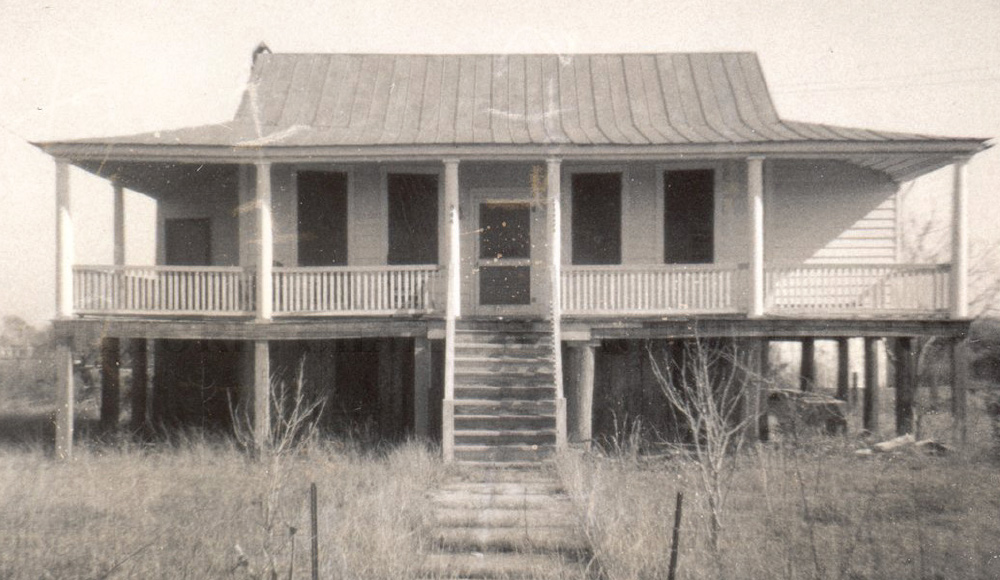
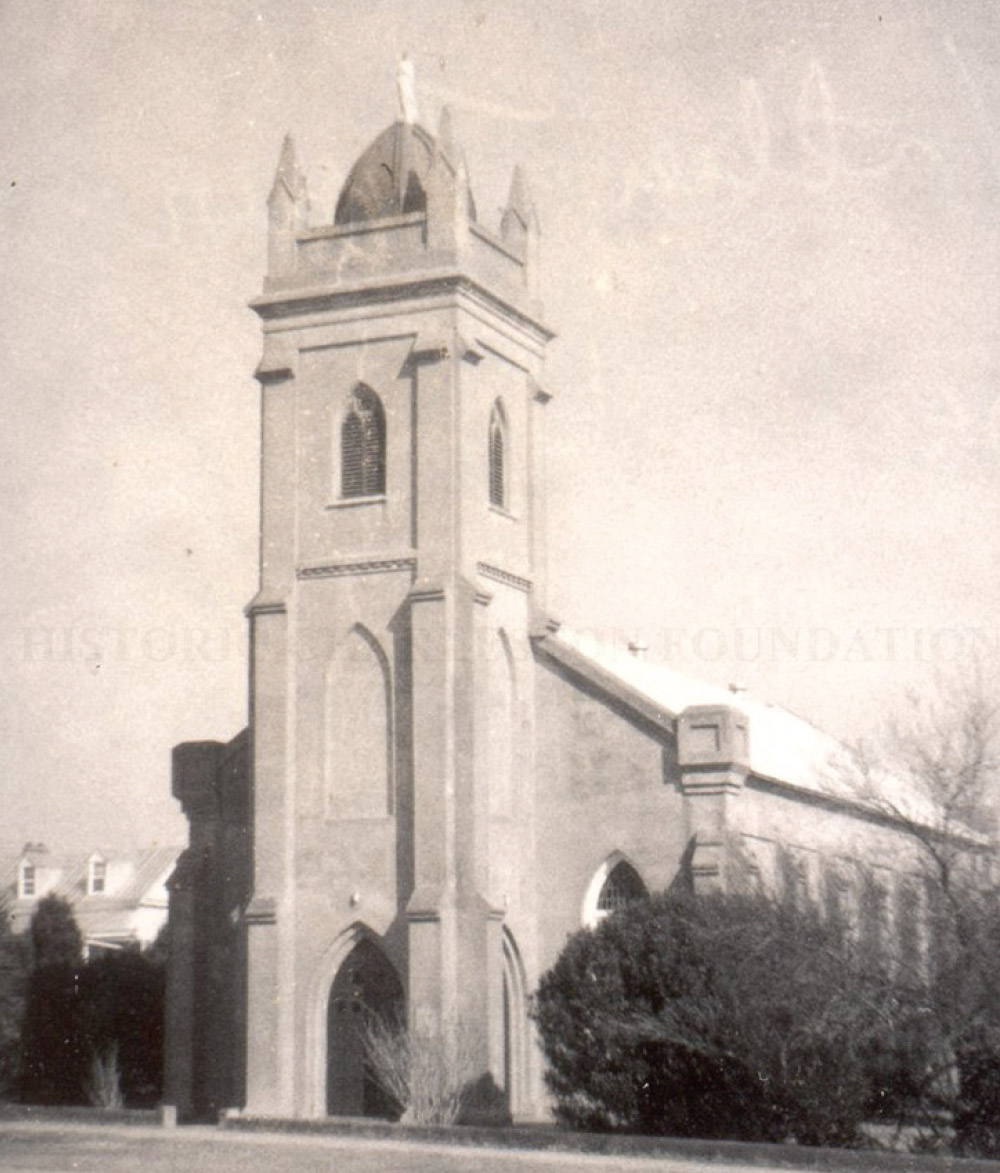
West did well in the maritime trade. His company transferred him to the Upstate and later to Atlanta. “I was making money, I had the girl, I had the lifestyle in Atlanta, I was traveling. It was fun. But it wasn’t necessarily fulfilling. Something was missing.” He was just 25.
Around this time, West’s father died of cancer. His father was larger than life, and his death had a profound impact on West.
“My father was 6-foot-5 and 260 pounds, kind of a John Wayne type, and in 18 months, he lost well over 100 pounds,” says West. “But he suffered with such dignity and faith and hope that anyone who would have known my father during that period would be inspired by how he had the extraordinary faith to know that there was so much more lying ahead – that this was a transition.”
Inspired by his father’s example, West began attending church again, and soon, a long-suppressed idea rekindled. “When I was a young kid in Catholic school, the sisters all encouraged us boys to become priests. For some reason, that idea had resurfaced in my thinking. And, of course, I dismissed it immediately, multiple times. This is crazy. You’re not holy enough, you’re not smart enough, you’re not religious enough. This is not for you. What are you thinking? But it just would not go away.”
So he applied to Mount St. Mary’s Seminary in Emmitsburg, Md., where he earned a master of divinity and a master of arts in church history. Upon graduation, he was ordained in Charleston to serve as a priest at the Cathedral of St. John the Baptist on Broad Street. One day, the bishop called West into his office and told him to pack his bags for Rome, where he would study law at the Pontifical Gregorian University, an ecclesiastical school founded in 1551. The curriculum was taught in Italian, of which West did not speak a lick. He was given two months to learn the language before beginning classes. He graduated from the intensive two-year program with honors and serves as a canon lawyer and judge in church court.
The next dozen years passed in a blur of prayer, service and sermons. He was assigned to create a new parish in Bluffton, S.C., starting with a flock of less than 100 and growing to more than 5,000. Next, he took over a 1,000-square-mile parish in the Upstate with churches in Clemson, Seneca and Walhalla before returning to Charleston in 2014. The bishop wanted him to start a new parish on Daniel Island, where his old high school, Bishop England, had relocated in the late 1990s. He had no office, not even a phone. But he had years of experience in the church, business acumen and a tireless work ethic passed down from his father.
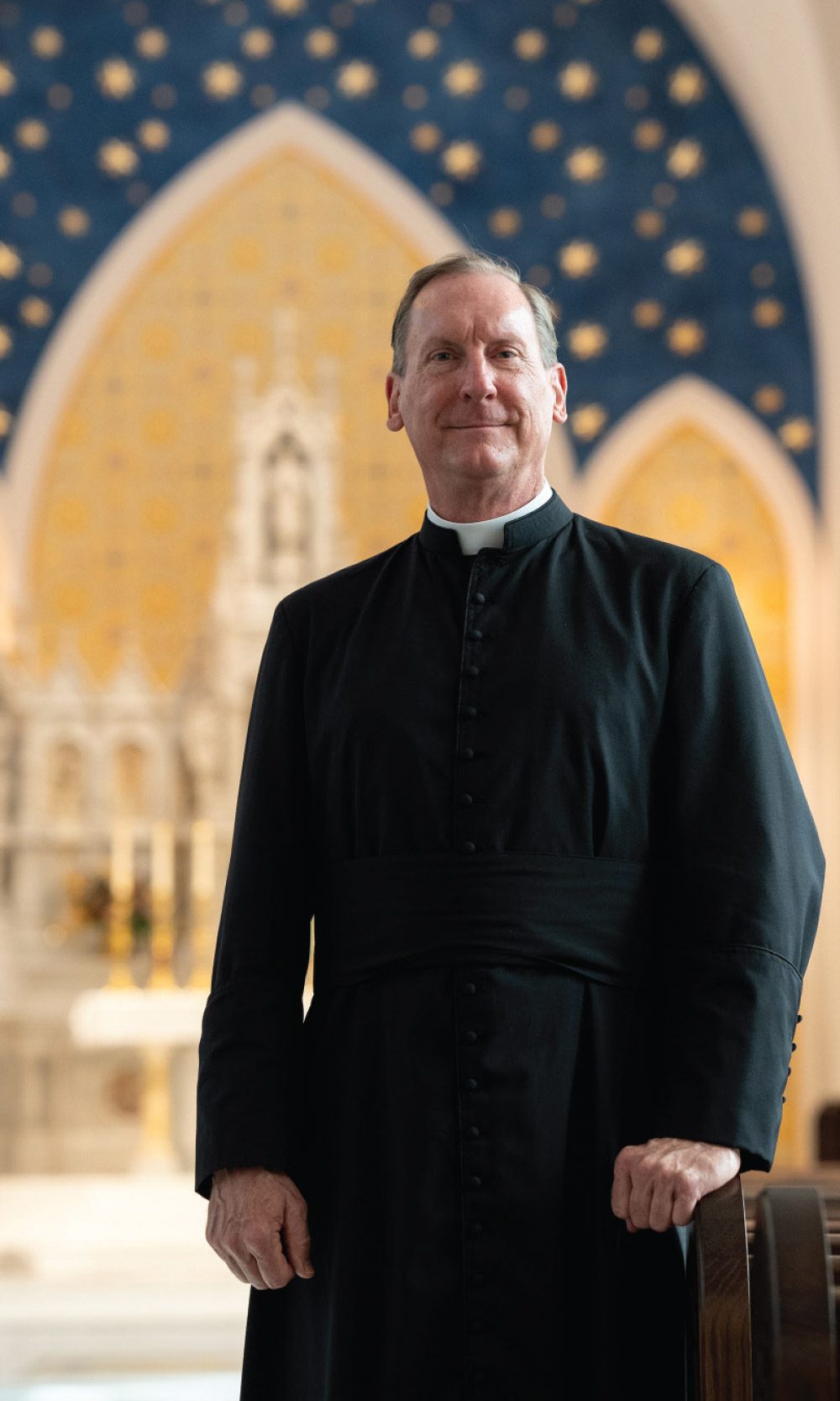
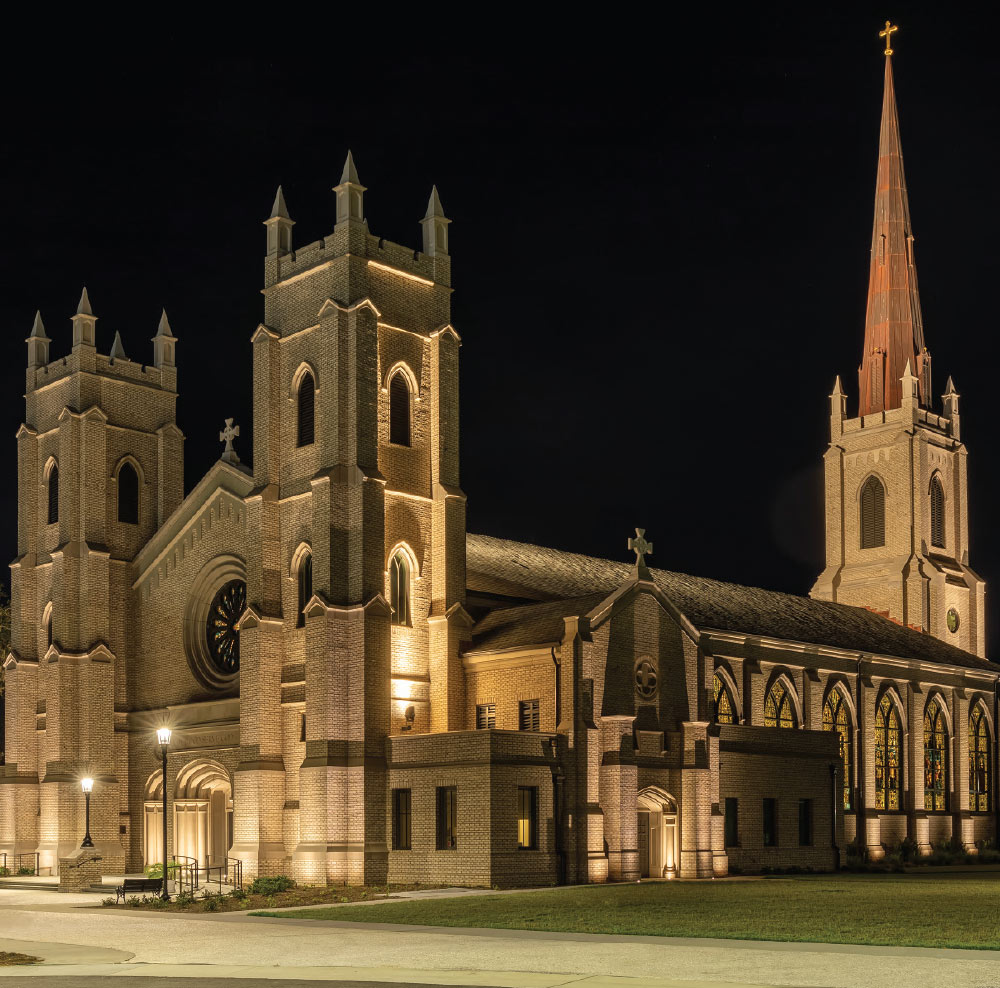
“Looking back at my college education, some of the art appreciation and some of the history of architecture classes I took all lent themselves toward the planning of this project,” he says. “And then the skills I picked up in the workforce – having to be highly organized, systems management, deadlines, accuracy – all those sorts of things kicked into overdrive.”
The parish considered 35 names for the church before settling on St. Clare of Assisi, founder of the Order of St. Clare (known informally as the Poor Clares) and a protégé of St. Francis of Assisi in 13th-century Italy. She was legendary for her uncompromising devotion to poverty and prayer.
The striking contrast between St. Clare’s austerity and the affluence of Daniel Island, where the average household income is over $2.5 million, is not lost on West. He is quick to praise the extraordinary generosity of his congregation, which has raised nearly $1 million for the underserved. The stunning neo-Gothic-inspired church opened its doors in April 2023 without a penny of debt. The parish began with 200 members and now counts 3,400 parishioners on its rolls.
West says the church, which has won several national and regional awards for excellence, is a celebration of Christ and a reflection of St. Clare’s belief in the beauty of a life with purpose.
“She was a woman of great simplicity and austerity, and she walked away from her wealth. And the Daniel Island and neighboring demographic is not exactly that. And so, it seemed kind of contrary. But the reality is, she was so immersed in her understanding of beauty … that we knew that we had to really emphasize beauty in all things because God is ultimate beauty.”